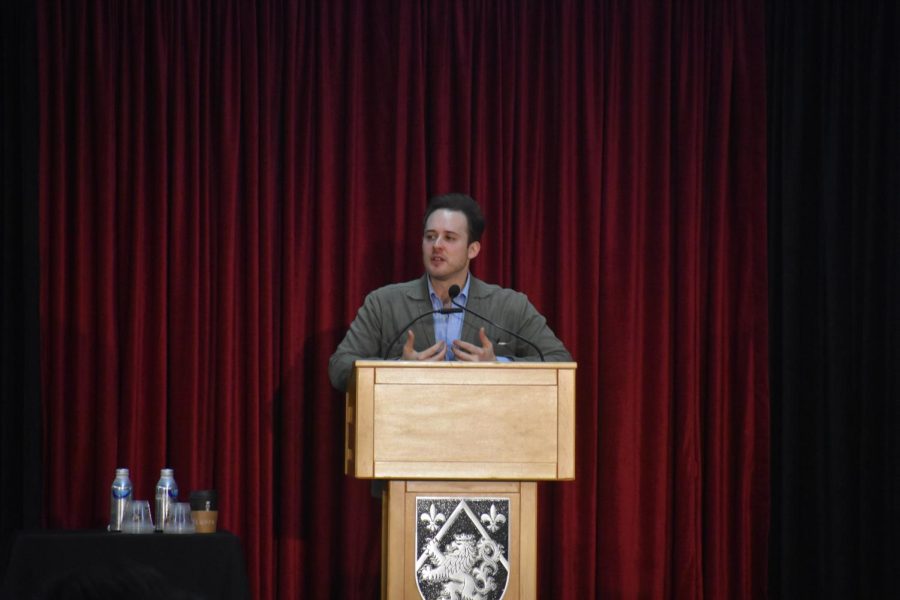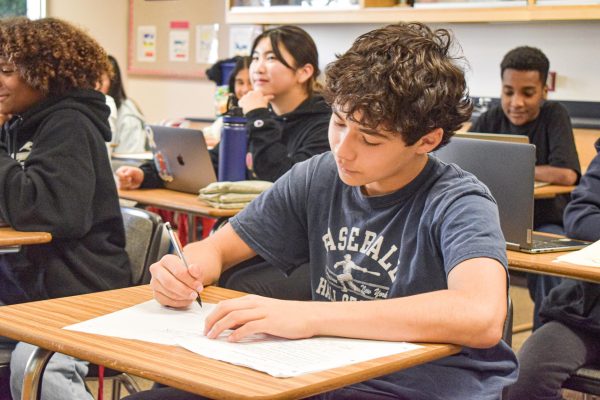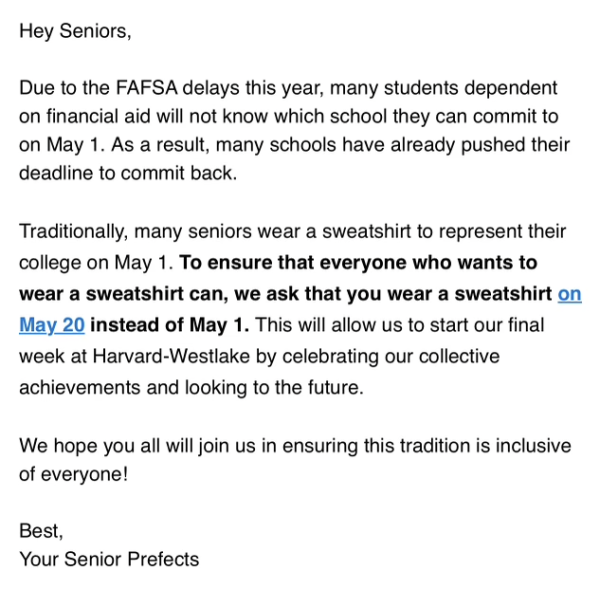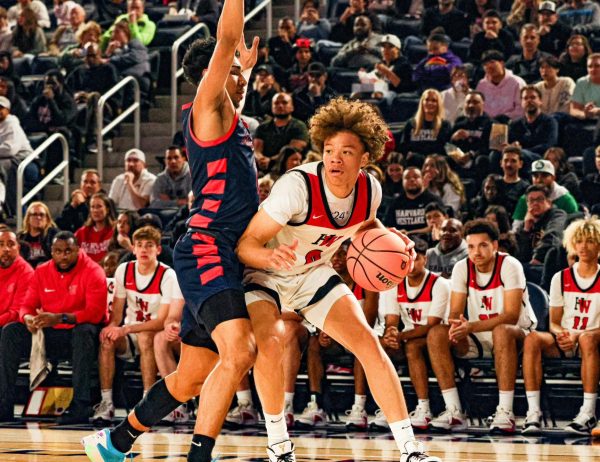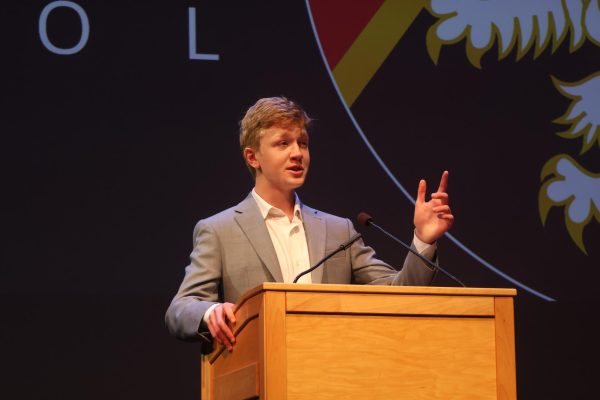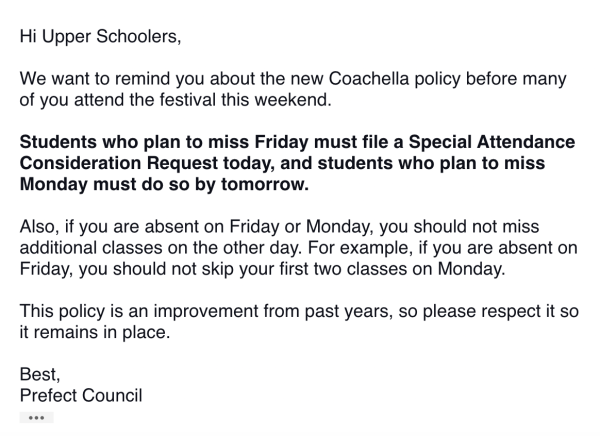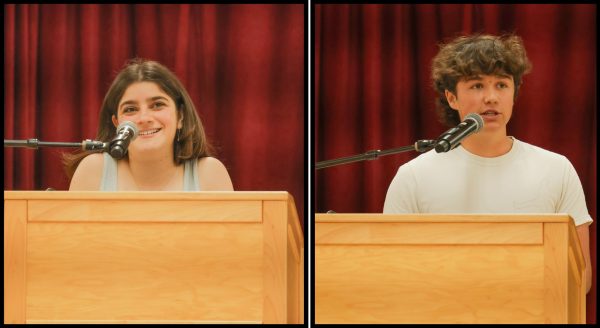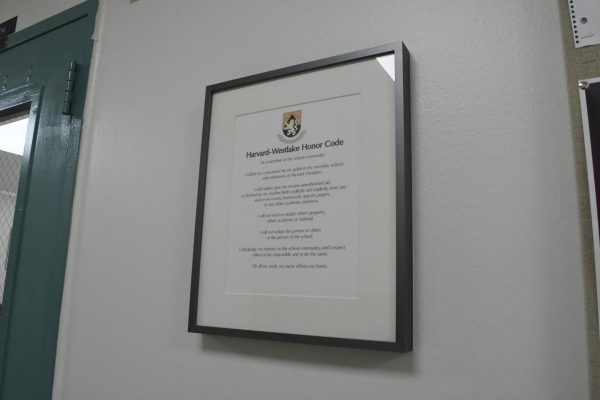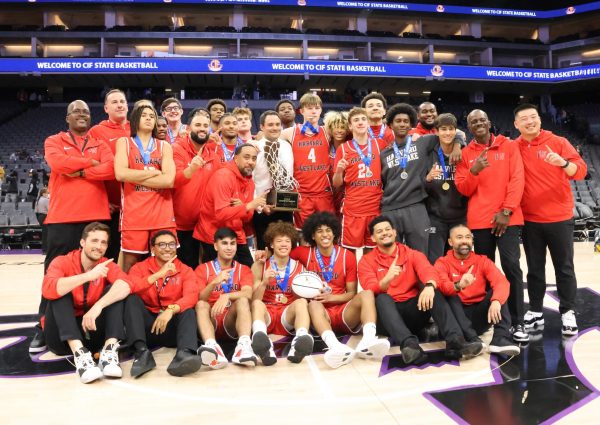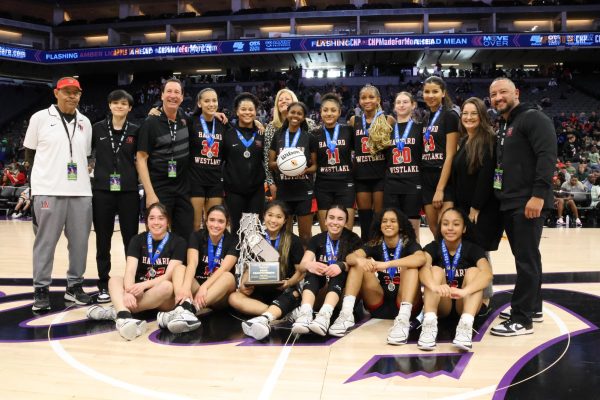Jewish activist Ben Freeman speaks on antisemitism
Jewish activist Ben Freeman speaks to the upper school community in Taper Gym.
November 22, 2022
Jewish author, educator and DEI specialist Ben Freeman spoke to the Upper School on Oct. 25 following recent incidents of antisemitism.
Freeman was brought in to speak soon after several Nazi swastikas and the words “Hitler Rocks” were found carved into an upper school desk. This was part of a larger response to the incident, which was outlined in that same email. Freeman spoke about antisemitism, hate speech and the importance of communities. .
Freeman said there has been a long history of antisemitism, which goes well beyond the antisemitic acts that occurred at the school.
“It is a miracle that I am standing here in Harvard-Westlake, in 2022 and we are talking about Jewish identity,” Freeman said. “The reason that it is a miracle is because of the long history of Jew hatred. There was an incident at Harvard-Westlake where a swastika was carved into a desk. And that may be an incident at this school, this year, in this country and this city. But it is something connected to a much deeper history [of antisemitism], which stretches back thousands of years.”
Middle East Studies Teacher and Jewish Club Advisor Dror Yaron said Freeman’s definition of antisemitism as a series of stereotypes resonated with him.
“One very important point that Freeman made is that antisemitism is not merely another iteration of racism against Jews,” Yaron said. “Antisemitism is an insidious conspiracy theory, which holds that Jews are disproportionately powerful imposters and swindlers. This type of conspiracy theory currently emanates from both the right and left of the political spectrum.”
Freeman said that being Jewish extends beyond religion.
“There’s a misconception that to be Jewish is thought of as simply a religious identity,” Freeman said. “I wear a Star of David necklace and a Kippah to show the world that I’m a proud Jew. Not to show the world that I believe in God, or I believe certain things or a faith. It’s not really about that for me. It’s about the way I was born, the community that I was born into, the history that I belong to, the lineage [and] the ancestry.”
Yaron said he was captivated by Freeman’s argument about Jewish identity and indigenous right to certain land.
“Ben Freeman made a compelling case that Judaism is not merely a religious tradition but that the Jews represent a nation,” Yaron said. “His stress that the Jews possess indigenous rights to the land between the Jordan river and the Mediterranean Sea is key to understanding their identity. And yet, these inherent indigenous rights and nurturance of deep historical memory does not necessarily preclude indigenous status of other people living on the land, namely the Palestinian Arabs. Sovereignty over the whole territory however is currently a rather contentious issue, one which is too politically complex to broach in this space.”
Jewish Club Leader Charlotte Newman ’24 said Freeman’s speech did a good job of connecting the history of antisemitism and recent events.
“I’m really glad he talked about historical antisemitism, like blood libel and economic libel,” Newman said. “I thought that was very important and he did a really good job integrating that into the discussion about what happened at school.”
Newman said she is hoping that more people, not just Jewish students, will attend Jewish Club to continue to talk about the issues Freeman mentioned in his speech.
“I’m hoping that more people and not just Jewish people will come to Jewish Club because I think having that space is really good,” Newman said. “I also think it’ll be good because people are just more aware of the fact that [antisemitism] is real. Growing up in Los Angeles people don’t realize how important it is to be aware of Jewish issues. So I think it’s important that education on antisemitism
Freeman also spoke about antisemitic comments that rapper Ye (born Kanye West) made on Twitter. Freeman displayed a picture of West’s hateful tweet and said the ideas West is sharing are racist and dangerous.
“I want to say very clearly the things [West] said are not funny, and they are racist,” Freeman said. “The idea that Jews are rich and powerful, and that Jews control the world is something which has led to the murder of Jewish people.”
Jewish people constitute only about 2.4% of the total population in the United States, but were on the receiving end of 54.9 percent of all religiously motivated hate crimes in 2020, according to the Federal Bureau of Investigation’s 2020 Hate Crimes Statistics.
Eric Vartany ’24 said it was important Freeman spoke to the school in light of recent antisemitism.
“I thought it was very enlightening given the current situation at Harvard-Westlake and the tweet by Kanye that has sparked antisemitism in Los Angeles and around the world,” Vartany said. “It was very important to hear how antisemitism is still present today and look at the history of how it evolved over time.”
Member of the Jewish Club Aviv Pilipski ’25 said he appreciated how quickly the school arranged a speaker to talk about antisemitism.
“It was really impressive that the school took the initiative to bring someone to talk about antisemitism from the perspective of a high school and on the global scale,” Pilipski said. “I think it is an important conversation that really isn’t brought up a lot in high schools around the U.S.”
Pilipski said although he learned a lot from the information in Freeman’s presentation, he would have appreciated hearing Freeman speak more about how to address antisemitism.
“I thought [Freeman] was really good, and he did a good job
outlining the history of antisemitism and hateful acts towards Jewish people,” Pilipski said. “I wish there were a little bit more tips for being more actionable in the community. I wish he would have talked to us more about how to actually respond to antisemitism, but it was still important to learn about it.”
Freeman said it is essential for all groups of people to define their own identity, including the Jewish community.
“The idea of each group being able to define their own experience and identity is the basis of my work here today,” Freeman said. “LGBTQ people must be able to define our experience and identity. This is something that every community should do, and of course, that includes the Jewish people. We must be able to define our own experience and identity.”
Vartany said Freeman’s emphasis on the importance of taking pride in your own identity resonated with him.
“His connection between gay pride and Jewish pride was very strong,” Vartany said. “As in both circumstances, the only way to combat being hated by society is being proud of your identity and not listening to other people’s definitions of what your identity is. Because you know better than anyone who you are and what your identity is.”































